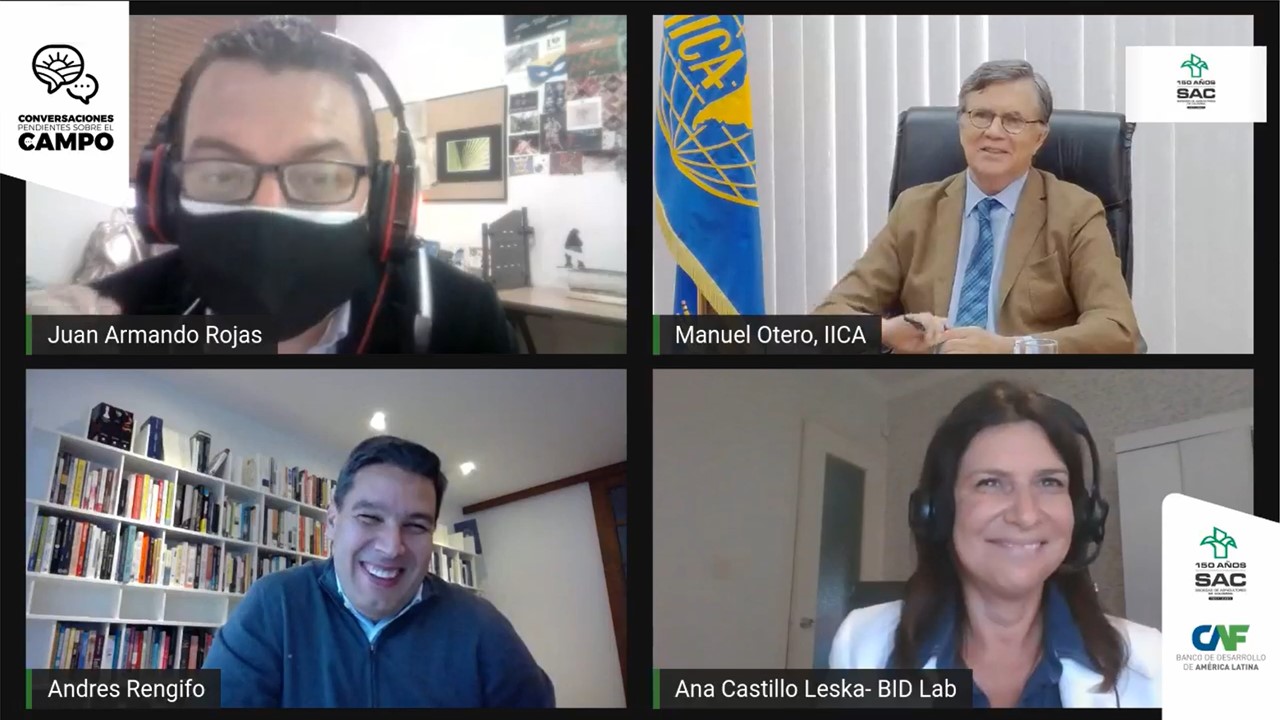The Director General of IICA, as well as IDB and Microsoft officials, participated in the event “Dynamics of and Outlook for AgriTech in Latin America”, organized by the Colombian Farmers’ Society (SAC) and the Development Bank of Latin America (CAF).

San Jose, 3 November 2021 (IICA). Connectivity, digital literacy, practical technological solutions that are tailored to the real needs of small and medium-scale farmers, as well as effective public-private partnerships, are key elements for expanding the adoption and implementation of AgTech in Latin America and the Caribbean (LAC).
This was the consensus of the experts who participated in the fifth event of the series Conversaciones pendientes sobre el campo (“Pending conversations about the countryside”), an initiative of the Colombian Farmers’ Society (SAC) and the Development Bank of Latin America (CAF) that addresses global trends and challenges that are transforming agrifood systems, as well as the actions and innovations that must be adopted to capitalize on opportunities, mitigate risks and meet the challenges that these transformations pose for the agriculture sector.
The Director General of the Inter-American Institute for Cooperation on Agriculture (IICA), Manuel Otero, as well as Ana Castillo, Senior Specialist of the IDB Lab, and Andrés Rengifo, Director of Corporate, External and Legal Affairs of Microsoft Colombia, participated in the latest dialogue, entitled “Dynamics of and Outlook for AgriTech in Latin America”.
Journalist Juan Armando Rojas, of the Colombian news program CMI, served as moderator.
The term AgTech encompasses a wide range of new technologies applied to agriculture to increase its efficiency, productivity and sustainability. According to the specialists at the event, AgTech is crucial to transform agrifood systems, guarantee food and nutritional security, bridge existing gaps between urban and rural areas, and improve the living conditions of family farmers.
“In addition to these new technologies, we can and must involve youth, who, in some cases, will develop and apply these technologies. To this end, we must address pending issues such as digital connectivity and literacy. Our continent cannot afford to miss out on the great frontier of knowledge and the budding revolution in the agriculture sector”, remarked Otero.
With respect to digital literacy, the Director General of IICA noted that “only 17% of producers in general know how to take advantage of smartphones” and, consequently, awareness-raising efforts are needed in order to “understand what they want and need to advance in terms of productivity”.
“Today’s and tomorrow’s farmers must have full access to new technologies and empowerment; they must play a leading role in this new era in which agriculture is called upon to serve as a strategic player in any sustainable development strategy, as concluded at the recent UN Food Systems Summit”, added the head of the specialized agency for agriculture and rural development.
The Senior Specialist of the IDB Lab emphasized the fact that “80% of producers in LAC are small and medium-scale farmers, and the bulk of AgTech solutions today are primarily designed to reach large companies”. Therefore, she explained, part of the challenge involves coordinating public-private efforts to develop and design strategies that facilitate “relevant, inclusive solutions that are tailored to the real needs of farmers”.
“The adoption of technologies among small-scale farmers is possible. At present, we must adopt a more inclusive approach, incorporate the gender perspective, and foster diversity. The size of a farm must not limit its ability to utilize affordable, appropriate and relevant technologies for the purpose for which they are being developed”, explained Castillo.
“We have a role to play in accelerating these processes and reducing inequalities between the countryside and cities. Regardless of where we live, we all have the right to access and receive services of the same quality. This is a significant challenge, and it involves not only technology, but also the issue of digital skills, reviewing processes, and generating new capabilities among producers who may not have them today. This digital transformation process goes one step further”, she added.
The Director of Corporate, External and Legal Affairs of Microsoft Colombia noted that, despite the various limitations and restrictions, technology “is reaching rural farmers and teaching them how to utilize their plots and crops in a more effective, productive and sustainable manner”.
However, he was clear in pointing out the importance of synergies between the public and private sectors to move forward with a swifter incorporation of more and new technologies in all corners of rural areas, where “national science and technology systems, as unifiers of these great efforts, can serve as a very important means for achieving this goal”.
“As a society, we have been talking about public-private partnerships for quite a while. The concept itself is well developed, but it must be put into practice. States must let go of their fear of working with the private sector, multilateral banks, organizations and think tanks. At present, no issue can be solved individually; many stakeholders must become involved”, concluded Rengifo.
During the meeting, the experts also agreed that the Covid-19 pandemic boosted and accelerated the use and supply of new technologies, leading to a digital transformation that is currently underway but still has a long way to go.
Video in Spanish
More information:
Institutional Communication Division.
comunicacion.institucional@iica.int











